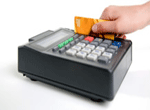
Credit card chargebacks can be an online merchant's worst enemy. Luckily, you can prevent and reverse chargebacks. You just need to arm yourself with good information, good customer service practices, and a few secret weapons. First, let's get to know our enemy, the dreaded chargeback:
What is a chargeback?
A chargeback happens when a credit card transaction is initially approved and the funds transferred to the merchant's account--and then later reversed. When a chargeback occurs, funds are removed from the merchant's account and credited back to the customer's card. Merchants are also charged additional fees and penalties on top of the amount of the original credit card transaction.
What causes chargebacks?
If a cardholder disputes a charge on his or her credit card statement, the issuing bank investigates--and if they find in the cardholder's favor, the transaction gets reversed and the customer gets his or her money back. Here are the three most common reasons cardholders initiate chargebacks:
- Credit card fraud: The sad reality of e-commerce is that stolen credit card information is sometimes used to make purchases online. Chargebacks protect customers from credit card fraud.
- Deceptive or confusing marketing: If customers don't fully understand the terms of their purchase, they may dispute charges. This is particularly common with recurring, subscription-based charges--customers may think they're buying a one-time product or service, and initiate a chargeback when they see future charges on their credit card statements.
- Goods or services not delivered as promised: If a customer isn't happy with what they ordered--or, worse, if it never arrives--they may call their credit card issuing bank to ask for a chargeback.
Can chargebacks ever be a good thing?
As an online merchant, you're never happy to see chargebacks. But imagine a world without them! If customers didn't know that they were protected against credit card theft and fraud, they wouldn't feel safe using their cards--and you'd have a much harder time doing business. Because cardholders know that fraudulent charges can be reversed, they're comfortable entering their information into your online shopping cart.
However, not all chargebacks are created equal. Just as cardholders can be victims of credit card fraud, merchants can get hit hard by chargeback fraud when customers lie or mislead their credit card issuers into reversing charges for goods or services they purchased legitimately. Also, some customers initiate chargebacks out of simple confusion--when they don't recognize or remember a charge on their statement.
Preventing and reversing chargebacks
You're not powerless against chargebacks. Here are 6 secret weapons that will help you fight back against most chargebacks:
- Deliver on your website's promises. This is the simplest and most important action you can take to protect yourself against chargebacks. Describe what you sell accurately, and ship it on time.
- Use Card Security Codes (CVC) to protect your customers from credit card fraud. By only accepting orders that provide valid security codes, you'll weed out a great deal of fraudulent charges--and avoid a lot of chargebacks!
- Use Address Verification Service (AVS) to cut down on fraud. AVS requires your customers to enter a billing address that matches their credit card information. This makes it harder for credit card thieves to operate online--and makes your transactions safer from fraud-related chargebacks.
- Use Shipping Tracking. Ship your goods with a service that provides tracking, so you can see when delivery occurs. For extra protection, require a signature for delivery, especially for big-ticket items. That way, customers can't claim their order never arrived.
- Obtain a signed authorization for transactions over $1500. For your biggest-ticket items, e-mail or fax an authorization form. Require customers to provide card information and a signature.
- Customize your billing descriptor. The billing descriptor is the line on a customer's credit card statement that tells them where a charge comes from. Confusing billing descriptors are the cause of numerous chargebacks, when customers simply don't remember a purchase they made. Your billing descriptor should be easily recognizable, with your company name and phone number. Not every payment processor allows customized billing descriptors. Learn more about how to reduce chargebacks by customizing your billing descriptor on the Instabill blog.
Instabill is an online payment processor specializing in high risk merchant accounts.
